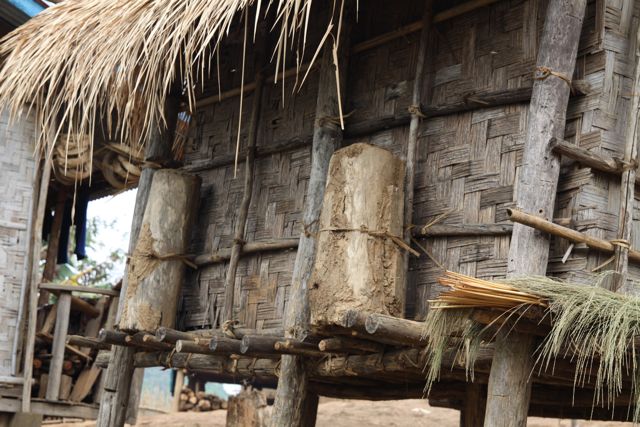Project Phongsali 2011: The victims we help are people with families, jobs, hopes, dreams, skills and interests. Meet Mr. Bouncham: beekeeper.
Day Twenty-Six
We’re still plugging along at Mr. Bouncham’s farm, searching for bombies and marking them for demolition. The rocky soil here is challenging but may, in the end, prove to be an excellent training ground for our novice deminers; they must excavate methodically, deliberately, economically, always alert least they mistake a bomblet for a stone and strike it with a trowel or attempt to forcefully pry it from the ground.
Mr. Bouncham so appreciates our help that he constantly hovers nearby, asking after our needs. Unfortunately, he’s taken to welcoming us onto his property with early-morning shots of rice whiskey. He always says, “Just one” but true Lao hospitality cannot stop with a single stingy shot. Courtesy demands that the host serve at least two rounds and that guests down each drink in a single gulp.
Obviously, in an ideal world bomb removal and drinking hard liquor would be segregated activities. But…this is Laos and some accommodation must be made. Therefore, when Mr. Bouncham appears with a bottle of lao-lao in hand, I shoo the deminers off to the worksite and interpose myself between booze and bomb.
On Day One, I naively put my faith in candor: “Its too early. I didn’t eat breakfast. Maybe later.” That shot landed on an empty stomach.
As Mr. Bouncham poured another round, I tried to reason with the man: “I’m working today. I’ve got to have a clear head.” That second shot slid down a throat still burning from the first.
When Mr. Bouncham started to pour a third, I simply wimped out: “We Americans can’t drink like Lao men, just pour me half a shot.”
On Day Two, I played my trump card and faked illness: “Today, my stomach is sick. I’m maybe going to throw up. Maybe I must run to the toilet. Today, I don’t dare drink lao-lao for breakfast.”
All I accomplished was to send Mr. Bouncham looking for his reserved stash of medicinal lao-lao, rice whiskey that he’s laced with special herbs and, him being a beekeeper, a generous dollop of honey.
After the first shot, desperate to waylay a second, I raved over the honey and insisted that Mr. Bouncham immediately take me to the source. It worked! He led me outside and, from a chosen distance, proudly pointed to several hollow logs nailed to the back wall of his house. Each log was home to a separate colony consisting of a single egg-laying queen and a multitude of workers. On this day, we could both see and hear the industrious insects at work. Hundreds, perhaps thousands, were in flight between hive and honey flow.
I played dumb and walked boldly up to the first log. Mr. Bouncham grabbed my arm and tried to pull me aside. He barked an order to Yai (who was obediently standing well back from the hives). “Tell him he’ll get stung!”
Ignoring that warning, I stepped within a foot of the first hive. Mr. Bouncham, like most beekeepers, is indifferent to stings himself, but was clearly worried that a guest might blunder into a confrontation and painfully suffer for it.
I then told Mr. Bouncham that I also raised bees, knew their habits, and was confident that the workers coming and going from his hives had more important things in mind, and greater purpose in life, than stinging me.
I invited Yai to join me in a simple farmyard pleasure. I sat on the ground a few feet in front of the hives, facing bees that were returning from the field. Never particularly graceful fliers anyway, those bees were burdened with ponderous loads of nectar and pollen. They lumbered toward home in unsteady flight, each hoping to execute a crash landing at their hive’s access hole.
To avoid my obstruction the returning bees had to adjust flight and either soar above or swerve around me. (I was an inconvenience but the bees paid me no more attention than they would a rock or tree.) Mr. Bouncham told me that he sometimes studies bees in flight and calculates a beeline with the goal of learning where honey is flowing, or a wild colony is living.
I was surprised to learn how Mr. Bouncham’s husbandry skills differ from mine. He uses natural structures, mostly hollow logs, to house his colonies; I build brood boxes and honeys supers out of smooth, factory-planed wood and then apply multiple coats of bright, white paint. Mr. Bouncham’s hives look like a product of the rain forest; mine a product of Home Depot.
I buy my bees from an apiary supply house — a queen and enough workers to populate a fledgling colony arrive via, believe it or not, the US mail. Mr. Bouncham locates a wild colony in the forest, kidnaps the queen and a slew of workers, and resettles them in one of his hollow logs.
Unlike me, Mr. Bouncham never uses smokes to settle his bees before he enters their hive. He warned me that, “If you do that, soon they will not come back.” I told him that I couldn’t imagine opening a hive without first giving the bees a few puffs from my smoker.
But the greatest difference was how Mr. Bouncham dresses while harvesting comb and honey. He told me that he knows that, in most parts of the world, beekeepers don protective gear, often covering themselves from head to toe. I confirmed that I wear suit, helmet, veil and gloves.
Mr. Bouncham takes the opposite approach and strips almost naked. He told me that by wearing nothing more than a pair of briefs, he avoids trapping bees inside his clothing. He claims: fewer clothes, fewer stings.
All I could say was, “No smoke? No suit? No clothes? No way!”

